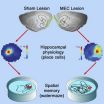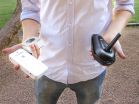(Press-News.org) Imagine being able to recognize your car as your own but never being able to remember where you parked it. Researchers at University of California, San Diego School of Medicine have induced this all-too-common human experience - or a close version of it - permanently in rats and from what is observed perhaps derive clues about why strokes and Alzheimer's disease can destroy a person's sense of direction.
The findings are published online in the current issue of Cell Reports.
Grid cells and other specialized nerve cells in the brain, known as "place cells," comprise the brain's inner GPS, the discovery of which earned British-American and Norwegian scientists this year's Nobel Prize for medicine.
In research that builds upon the Nobel Prize-winning science, UC San Diego scientists have developed a micro-surgical procedure that makes it possible to remove the area of the rat's brain that contains grid cells and show what happens to this hard-wired navigational system when these grid cells are wiped out.
One effect, not surprisingly, is that the rats become very poor at tasks requiring internal map-making skills, such as remembering the location of a resting platform in a water maze test.
"Their loss of spatial memory formation was not a surprise," said senior co-author Robert Clark, PhD, a professor of psychiatry. "It's what would be expected based on the physiological characteristics of that area of the brain," which is known as the entorhinal cortex and is the first brain region to break down in Alzheimer's disease.
But the rats retained a host of other memory and navigation-related skills that scientists had previously speculated would be destroyed without grid cells.
"The surprise is the discovery of the type of memory formation that was not disrupted by the removal of the grid cell area," Clark said.
Specifically, UC San Diego scientists were able to show that even without grid cells rats could still mark spatial changes in their environment. They could, for example, notice when an object in a familiar environment was moved a few inches and they could recognize objects, such as a coffee mug or flower vase, and remember later that they had seen these objects before.
Electrical recordings of signals transmitted from the hippocampus suggested that the animals had developed place cells - cells that are believed to convey a sense of location - and that these cells were firing when an animal passed through a familiar place.
"Their place cells were less precise and less stable, but they were present and active," said Clark, who is also a research scientist at Veterans Affairs San Diego Healthcare System. "That was a surprise because we had removed the spatially modulated grid-cell input to these neurons."
The axons of grid cells project into the hippocampus and it has been assumed that without this relay of information from the entorhinal cortex to the hippocampus, place cells would be unable to develop. "This is not the case," he said.
"Our work shows a crisp division of labor within memory circuits of the brain," he said. "Removing the grid-cell network removes memory for places but leaves completely intact a whole host of other important memory abilities like recognition memory and memory of fearful events."
INFORMATION:
Co-authors include Jena Hales, Magdalene Schlesiger, Jill Leutgeb and Stefan Leutgeb, UC San Diego; and Larry Squire, Veterans Affairs San Diego Healthcare System and UC San Diego
This work was supported, in part, by the National Institute of Neurological Disorders and Stroke (1R01NS086947-01), National Institute of Mental Health (MH24600 and MH020002-13) and the Department of Veterans Affairs.
Cats and humans have shared the same households for at least 9,000 years, but we still know very little about how our feline friends became domesticated. An analysis of the cat genome by researchers at Washington University School of Medicine in St. Louis reveals some surprising clues.
The research appears Nov. 10 in the Proceedings of the National Academy of Sciences Early Edition.
Cats have a relatively recent history of domestication compared with dogs; canines arose from wolves over 30,000 years ago.
"Cats, unlike dogs, are really only semidomesticated," said ...
A massive new University of Colorado Boulder study indicates there is a statistical link between hotter temperatures generated by climate change and the risk of armed conflicts in sub-Saharan Africa.
CU-Boulder Professor John O'Loughlin led a research team that assessed more than 78,000 armed conflicts between 1980 and 2012 in the Sahel region of Africa - a semi-arid belt just south of the Saharan Desert that spans about 3,000 miles and more than a dozen countries from the Atlantic to the Indian oceans.
The team was looking for links between armed conflicts and temperature ...
HOUSTON - (Nov. 10, 2014) - An analysis of more than 100 health insurance plans across Texas offered under the Affordable Care Act (ACA) shows that plans can differ significantly in premium cost and the number of hospitals included in insurance networks. That's just one of the findings of a report released today by the Episcopal Health Foundation and Rice University's Baker Institute for Public Policy.
The report examined "Silver" health insurance plans offered by insurers within the ACA's Marketplace. Texas is divided into 26 different geographic areas, with different ...
Philadelphia, PA, November 10, 2014 - Beta-blockers have been a cornerstone in the treatment of heart attack survivors for more than a quarter of a century. However, many of the data predate contemporary medical therapy such as reperfusion, statins, and antiplatelet agents, and recent data have called the role of beta-blockers into question. Two new studies published in The American Journal of Medicine evaluated the traditional management of these patients after their discharge from the hospital and in the light of changing medical treatment, as well as the impact of the ...
The adult human body is made up of about 37 trillion cells. Microbes, mainly bacteria, outnumber body cells by 10 to 1. Increasingly, scientists recognize that this huge community of microbes, called the microbiome, affects the health, development and evolution of all multicellular organisms, including humans.
Studies show symbiotic microbes can help prevent infection by disease-causing pathogens. But sometimes the interaction goes the other way, with a pathogen or disease disrupting the normal community of symbiotic bacteria. In a new study, a team of scientists from ...
ANN ARBOR--In a step toward robots smaller than a grain of sand, University of Michigan researchers have shown how chains of self-assembling particles could serve as electrically activated muscles in the tiny machines.
So-called microbots would be handy in many areas, particularly medicine and manufacturing. But several challenges lie between current technologies and science fiction possibilities. Two of the big ones are building the 'bots and making them mobile.
"We are inspired by ideas of microscopic robots," said Michael Solomon, a professor of chemical engineering. ...
BUFFALO, N.Y. - Most people rarely sing publicly outside of a duty-bound rendition of "Happy Birthday." And since that particular song is usually offered as a group performance, even the reluctant join in the spirit of the occasion, hoping their individual shortcomings will be cloaked by the chorus.
"I can't sing," says the hesitant performer. But a University at Buffalo psychologist believes that most people are not as bad at singing as they might think and he is collaborating on the development of an online test that will evaluate participants' ability to match specific ...
Boulder, Colo. -- Nov. 10, 2014 -- When the double asteroid Patroclus-Menoetius passed directly in front of a star on the night of Oct. 20, a team of volunteer astronomers across the U.S. was waiting.
Observing the event, known as an occultation, from multiple sites where each observer recorded the precise time the star was obscured, yielded the first accurate determination of the two objects' size and shape. The analysis was led by Dr. Marc W. Buie, staff scientist in Southwest Research Institute's (SwRI) Space Studies Department in Boulder, Colo.
The team effort was ...
Scientists at the University of Arizona have discovered what might be the closest thing to "baby photos" of our solar system. A young star called HD 95086 is found to have two dust belts, analogous to the asteroid and Kuiper belts in the Solar System, surrounded by a large dust halo that only young planetary systems have.
Similar dust structures are also found around another, slightly older star called HR 8799, where four massive planets occupy the large gap between the two belts. HR 8799, the first star found to host four directly imaged planets, is often referred ...
A new class of apps and wireless devices used by private pilots during flights for everything from GPS information to data about nearby aircraft is vulnerable to a wide range of security attacks, which in some scenarios could lead to catastrophic outcomes, according to computer scientists at the University of California, San Diego and Johns Hopkins University. They presented their findings Nov. 5 at the 21st ACM Conference on Computer and Communications Security in Scottsdale, Ariz.
`
Researchers examined three combinations of devices and apps most commonly used by private ...



